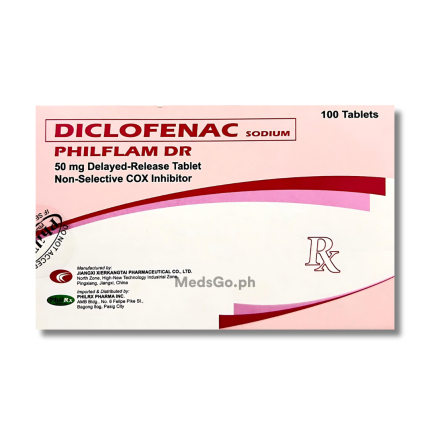All variations
Indications / Uses
PHILFLAM DR Diclofenac 50mg is used for the management of various inflammatory and painful conditions, including rheumatoid arthritis, osteoarthritis, and ankylosing spondylitis. This non-steroidal anti-inflammatory drug (NSAID) effectively reduces inflammation and swelling related to post-traumatic and post-operative events. It is also indicated for the relief of mild to moderate pain, such as that associated with primary dysmenorrhea. The delayed-release formulation allows for sustained action in managing chronic musculoskeletal disorders.
Formulation / Ingredients
PHILFLAM DR Diclofenac 50mg contains: Diclofenac Sodium 50mg
Do I need prescription to buy PHILFLAM DR Diclofenac 50mg?
Yes, you need a prescription. But if you don't have one, you can get a free teleconsultation from MedsGo Physician. Just make an order and our Physician will call you back.
Side Effects
PHILFLAM DR Diclofenac 50mg common side effects include: gastrointestinal disturbances such as abdominal pain, nausea, diarrhea, and indigestion. Other frequently reported effects are headache, dizziness, and mild fluid retention (edema). Although less common, there is a risk of serious events including gastrointestinal bleeding or ulceration, which can occur at any time during use. The medicine is also associated with an increased risk of serious cardiovascular thrombotic events like heart attack and stroke.
Directions and Dosage
- Dosage for Adults (18+ years): 50 mg to be taken 2 to 3 times daily.
Maximum daily dosage should not exceed 150 mg in 24 hours. The duration of treatment should be for the shortest period necessary to control symptoms. Not recommended for individuals under 12 years of age.
Contraindications
Avoid use if there is a known hypersensitivity or a history of allergic reactions, like asthma attacks or hives, after taking similar pain relievers. This drug is also contraindicated for people with active gastrointestinal bleeding or ulcers, severe heart failure, or immediately before or after heart bypass surgery. Individuals with severe kidney or liver disease should also not use it.
Use in Pregnancy and Lactation
Treatment should be avoided during the last three months of pregnancy as it can harm the developing fetus and complicate delivery. Use during the first six months should be undertaken only when clearly necessary. The substance does pass into milk, so caution is advised for those who are nursing. The medicine may also affect fertility, making conception more difficult.
Special Precautions
- Monitor the signs of fluid retention, as the medicine can cause swelling and may exacerbate existing heart problems or high blood pressure.
- Caution is necessary for individuals with a history of gastrointestinal disorders, as the risk of bleeding or ulceration is increased.
- Regular monitoring of kidney and liver function is important during extended periods of use.
- The medicine may prolong bleeding time, requiring caution in those with blood disorders.
Is it safe to take it with other medications?
Taking this medicine concurrently with other non-steroidal pain relievers increases the risk of side effects, especially stomach upset. It may also increase the likelihood of bleeding when combined with blood-thinning treatments. The effectiveness of some blood pressure lowering agents may be reduced when taken together with this drug.
How should I store it?
Keep the tablets below 30°C and away from moisture. Ensure the medication is stored in its original packaging and shielded from direct sunlight.
Used For
- Pain, Inflammation, Arthritis
Age
- 12 years & up
Features
- Diclofenac
Reviews
No reviews found
Product Questions




